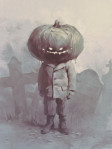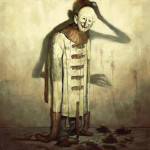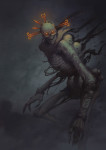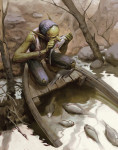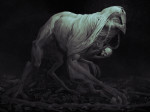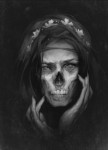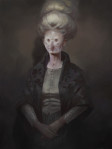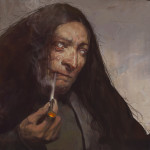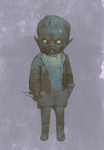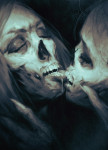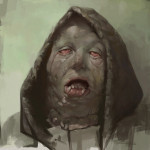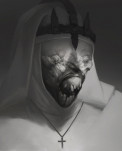Rick Wayne's Blog, page 37
September 20, 2019
(Art) The Russian Blade Runner of Anastasia B.
[image error]
The work of Russian artist Anastasia B. looks like something out of a never-made samzidat version of Blade Runner.

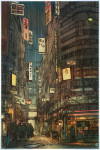
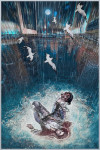
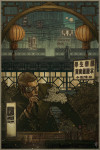
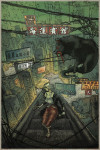

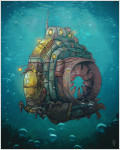
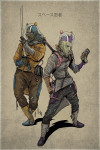
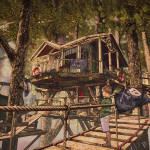
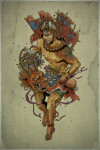
September 19, 2019
(Feature) Biology as Ideology
RC Lewontin’s short collection of essays “Biology as Ideology” was formative for me.
As you might expect of a nearly 30-year-old book, parts of it have not aged well. His rant against the Human Genome Project, which in 1991 was threatening to consume several decades and millions of public dollars, seems a bit misplaced given the speed with which it eventually concluded.
The historical lesson is important however – predicting technologies that will exist in just five years’ time is nearly impossible. His conclusion as well is eerily prescient:
“Some farsighted biologists have cautioned against the disillusionment that will follow. The public will discover that despite inflated claims of molecular biologists, people are still dying of cancer, of heart disease, of stroke, that institutions are still filled with schizophrenics and manic-depressives, that the war on drugs has not been won. The fear among many scientists is that by promising too much [in the pursuit of funding and career], science will destroy its public image and [the public] will become cynical…”
In large part, that is exactly what happened this century with the anti-vaxxer movement, the cottage industry of climate change denial, and the rest, all of which have found fertile ground with a public skeptical of the human institution of science.
We can’t lay that at the feet of the HGP specifically of course, but rather at the larger university-industrial complex of which it was part. Just as there is a deep economic infrastructure that benefits significantly from military conflicts overseas, so too with scientific and technical research.
Our image of the private inventor is a lone man tinkering in his garage, soldering motherboards or the like. As with so much else, if that ever was, it ceased to be in the internet era. Development of the search technology that became the Google megacorp, for example, was a group effort funded by taxpayer dollars while the company’s founders were graduate students at Stanford. Everyone involved has since become ungodly wealthy – except the taxpayer.
In that sense, whatever else it claims to be, science is also a human activity and not simply the immaterial quest for truth. In Lewontin’s phrase: ”Science is molded by society because it is a human productive activity that takes time and money, and so it is guided and directed by those forces in the world that have control over time and money.”
This seems to me to be a very unremarkable observation, yet the zealousness with which some people feel the need to qualify or even dismiss it illustrates just how close to the nerve it cuts. If the influence over research by those forces of social control – not only what gets studied and who gets credit but how and whether the public benefits from any of it – were truly as benign as advertised, it would be enough merely to acknowledge them and return to work.
It was both disappointing and disillusioning to me as a younger man that dogmatic reductionists like Richard Dawkins (or Dan Dennett in philosophy) are widely popularized at the expense of thinkers like Lewontin, who is an evolutionary geneticist and professor at Harvard. (One wonders how well Stephen Jay Gould could’ve raised the public consciousness if he hadn’t died so young.)
Selfish gene theory, to take one example, reduces every organism, including every human being, to a watery gene vector whose only real purpose is to gain resources and/or social status in the race to reproduce.
Not coincidentally, that also happens to be exactly what capitalists think, that you are a status-driven consumer.
If that seems obvious to you, consider that it hasn’t been the case for almost all of human history. We are consumers, yes, but we are not only consumers – or rather we didn’t used to be. Odd to claim it’s our innate nature now.
It’s not that selfish gene theory is wrong or that it was created as a means of social legitimation. Not at all. There is solid science behind it. But as a description of the world, it’s incomplete. As a popular theory permeating the public consciousness – selfish gene theory is where we get the word meme – it is not simply the result of a disinterested search for truth.
One should always be especially skeptical of any scientific theory that legitimates the prevailing social structure. The odds of such a correlation obtaining at random are practically nil.
Like any good iconoclast, Lewontin marches under no popular banner. In addition to taking on reductionism, he roasts some of the anti-scientific assumptions of the environmental movement – specifically, what I call “The Amish Myth.”
This popular environmental ideology first accepts the religious belief that humans are exceptional and not a natural function of the earth, same as any other animal, and second, enshrines a state of the world as it was imagined to exist at a particular time and place in the past: namely, Europe just before the industrial revolution, in much the same way that the Amish have chosen to persist at exactly the same point in our socio-technological development.
Again, you either find that correlation likely to be random or not.
Never mind that the mythical earth imagined in the popular environmentalism never actually existed, it’s fundamentally anti-scientific to assign ANY particular natural environment sacred status, just as it’s unscientific to perpetually suppress forest fires, which are part of that biome’s natural cycle.
Lewontin writes:
”First, there is no ‘environment’ in some independent and abstract sense. Just as there is no organism without an environment, there is no environment without an organism. Organisms do not experience environments. They create them. They construct their own environments out of the bits and pieces of the physical and biological world and they do so by their own activities… If genes change in evolution, the environment of the organism will change too.
The second rule [of the real relation between organism and environment] is that the environment of organisms is constantly being remade during the life of those living beings. When plants send down roots, they change the physical nature of the soil, breaking it up and aerating it. They exude humeric acids. They change the height of the water table by removing water. They alter the humidity in their immediate neighborhood, and the upper leaves of a plant change the amount of light that is available to lower leaves… Moles and earthworms completely change the local topology. Beavers had at least as an important effect on the landscape of North America as humans did until the beginning of the last century. Every breath you take removes oxygen and adds carbon dioxide to the world…
Every living organism is in a constant process of changing the world in which it lives by taking up materials and putting out others. Every act of consumption is also an act of production. And every act of production is an act of consumption. When we consume, we produce waste products that are in turn the materials for consumption for some other organism.”
My microbiology professor in medical school made this point often. We’re all closet mammalists, he said, actively prejudiced against most of the rest of the tree of life. The world we’re creating is a paradise for bacteria and many kinds of insects, which will flourish and diversify in our abundant waste.
Raising one class of creatures over another is not scientific. It’s ideological.
”A consequence of the universality of environmental change induced by the life activity of organisms is that every organism is both producing and destroying the conditions of its existence. There is a great deal of talk about how we as human beings are destroying the environment. But we are not unique in the fact that our life processes are recreating the world in a way that is in part hostile to the continuation of our own lives. Every bacterium uses up food material and excretes waste products that are toxic to it.”
You can test that claim at home with a petri dish and a cheek swab.
”Organisms ruin the world not only for their own lives but for their children as well… White pines can form an almost pure stand in an old field and many such white pine stands could be seen in New England earlier this century. However, they do not last. The pines make dense shade that is inhospitable to the growth of their own seedlings, and so they cannot replace each other. As the pines die or if, as in New England, they are cut wholesale, what comes next are hardwoods, whose seedlings have been waiting around for a little opening.”
When The Matrix came out, I remember I actually laughed out loud in the theater when Agent Smith told Neo “all organisms naturally seek a balance with their environment.” No, they don’t! Given the opportunity, many species of rodent will breed to the point of population collapse.
Not that the good professor or I are anti-environment. Quite the opposite. We’re opposed to the kind of social engineering that demands science conform to an a priori ideological truth.
This is the question of cause, or rather what kinds of explanations we will accept as causes.
”Modern biology is characterized by a number of ideological prejudices that shape the form of its explanations. One of those major prejudices is the nature of causes… nowhere more evident than in our theories of health and disease. Any textbook of medicine will tell us that the cause of tuberculosis is the tubercle bacillus… Modern scientific medicine tells us that the reason we no longer die of infectious diseases is that scientific medicine has defeated the insidious bacterium…
What is the evidence for the benefits of modern scientific medicine? Certainly, we live a great deal longer than our ancestors. [But] a very large fraction of the change in average life expectancy is a tremendous reduction in infant mortality. The gravestones of people who died in the middle of the 19th century indicate a remarkable number of deaths at an old age. In fact, scientific medicine has done little to add years for people who have already reached maturity. In the last 50 years, only about four months have been added to the expected life span of a person who is already 60 years old…
As we all know, in modern Europe women live longer than men, but they used not to. Before the turn of the century, women died sooner than men did, and a common explanation offered by scientific medicine is that a leading cause of death was childbirth fever… But a look at the statistics reveals that childbirth fever was a minor cause of death during the 19th century, even of women of childbearing age. Nearly all excess mortality was a consequence of tuberculosis, and when tuberculosis ceased to be a major killer, women ceased to have a shorter lifespan than did men…
There was no observable effect on the death rate after the germ theory of disease was announced in 1876 by Robert Koch. The death rate from infectious diseases continued to decline as if Koch had never lived. By the time chemical therapy for tuberculosis was introduced in the early part of this century, more than 90% of the decrease in the death rate from that disease had already occurred…
The progressive reductions in the death rate were not a consequence, for example, of modern sanitation, because the diseases that were the major killers in the 19th century were respiratory and not waterborne…
As far as we can tell, the decrease in death rates from the infectious killers of the 19th century is a consequence of the general improvement in nutrition and is related to an increase in the real wage. In countries like Brazil today, infant mortality rises and falls with increases and decreases in the minimum wage. The immense betterment of nutrition also explains the drop in the higher rate of tuberculosis among women than among men. In the 19th century in Britain, working men were far better nourished than home-bound women… So there have been complex social changes, resulting in increases in the real earnings of the great mass of people, reflected in part in their far better nutrition, that really lie at the basis of our increased longevity. Although one may say that the tubercle bacillus causes tuberculosis, we are much closer to the truth when we say that it was the conditions of unregulated capitalism…
In the past 20 years, precisely because of the decline in infectious disease as an important cause of ill health, other single causes have been raised as the culprits of disease… But to say that pesticides cause the death of farm workers or that cotton fibers cause brown lung in textile workers is to make a fetish out of inanimate objects. We must distinguish between *agents* and *causes*… Asbestos and cotton lint fibers are not the causes of cancer. They are the agents of social causes, and it is only through changes in those social forces that we can get to the root of problems of health. The transfer of causal power from social relations to inanimate agents that then seem to have a power and a life of their own is one of the major mystifications of science and its ideologies.”
There are more examples of this than could be easily summarized, but the story of leaded gasoline comes to mind. The incalculable suffering and violence that occurred as a result of latent lead poisoning in the last century was not caused by atoms of lead but a social system that takes little notice of such effects when they don’t impact the wealthy and powerful.
The Romans were aware of lead poisoning. They used lead to make pipes because it was economically efficient to do so, just as it was economically efficient for us to add tetraethyl lead to gasoline to increase engine compression. The Romans didn’t switch to a different metal, despite lead’s pernicious effects, because the primary recipients of lead-pipe-borne water, those who carried the burden of economic efficiency, were the plebs. Those who benefitted from it were the patricians.
The difference, then, between Roman society, which did not make the change, and modern Western society, which did, is not an improved understanding of the world – i.e. science. Both societies understood, if only empirically, that lead was poisonous. Rather, the difference was the social structure – the locus of power.
In that sense, I might disagree with Professor Lewontin that the cause of the tuberculosis epidemic was *specifically* capitalism. Rather, it was a social system, including capitalism, that allows one group to benefit at the expense of another. Theocracy, aristocracy, and oligarchy all had the same drawback. Any improvements over those older systems is not so much the result of capitalism as democratic reforms of it: child labor and occupational safety laws, a minimum wage, etc.
This kind of stuff matters for several reasons. The naïve view of science popularized by the university-industrial complex, what is sometime called scientism, is first and foremost a tool of legitimation and exploitation. And to the degree it creates a straw man that is easily slain, it leads (albeit unintentionally) to an increase in anti-scientism. Like the bacteria in the petri dish, it fosters an environment that leads to its own destruction, and with it, the advances in social and material well-being that genuine science brings.
It also impacts general human happiness. By now I think it’s fairly well known that despite being the longest-lived, most materially well-endowed society in history, we are unhappier than ever. Part of that is surely the fault of the naïve scientific worldview.
People continue to believe, for example, that their genes largely determine the bounds of their lives. Even if they are not explicitly aware of it, the view of the world taught in grade school and repeated throughout popular culture is that if one is exceptionally fat or talented, that is at least partially and nontrivially the result of one’s genes, which are inalterable.
”It is our common prejudice that even if one had practiced the violin from a very early age, one would not be able to play as well as Menuhin, and we think of him as having special neuronal connections. But that is not the same as saying those neuronal connections were coded in his genes.”
There was already overwhelming evidence in 1991, when this book was written, that what genes code for is not one specific, inalterable phenotype but rather a wide and extremely complex array of outcomes entirely dependent on environment.
Childhood nutrition is a greater predictor of overall health in adulthood than is genetic code. Indeed, the two human traits most highly conserved between parents and offspring are religion and political affiliation, neither of which are genetically determined – unless you suppose you are Christian because you inherited the Christian gene and your neighbor a Muslim for the same reason.
Average IQ of adopted children, while correlated with the IQ of their biological parents, is closer in absolute value to the average IQ of their adoptive parents. Similarly, 70% of the socioeconomic status you will achieve in life is predicted by the socioeconomic status of the parents that raised you.
We all know this. Regardless of genetic endowment, the children of rich people tend to be rich, even when those children are adopted.
Genes matter, absolutely. But they are hardly determinative.
So why are we continually told that they are? The simplest explanation that fits the facts is that that myth is a stable social control strategy. Certainly, it subtly encourages people not to demand widescale change, for if genes are largely determinative, then those who tend to the top of society must be there because they deserve it and any attempt to produce a different set of winners is not only doomed to fail but will actually oppose the natural order of things.
Popular science – specifically, reductive genetic determinism like selfish gene theory – legitimates the social order exactly as the church did in the prior era. It tells us that although we may not live in the best of all possible worlds, how things are approximates the best of all practically possible worlds. So shut up and get back to work.
If one were very cynical, one would note that science education itself subtly, almost perniciously reinforces this strategy. After all, if knowledge were actively withheld from us by those in power, such as the ability to read was in that prior era, we would know to actively seek it, as the oppressed always have (usually for their children).
Yet, these days we are all given a rudimentary science education. Science is not only NOT withheld from us, we are actually compelled to learn it in school.
Only we’re not. We’re compelled to learn the content of science. We make students calculate velocities and memorize the citric acid cycle, neither of which teach the non-specialist anything of lasting value, certainly not that the world – the human environment, which includes both the “natural” world we’ve constructed and the world of society – is manufactured and therefore malleable.
Not that I have any hope science educators will be so enlightened as to free their students from the periodic table. The primary function of education – how it’s been manufactured – is not to turn out enlightened citizens but rather technically competent workers for the post-industrial economy.
If you don’t believe that, or if you merely believe it cynically, consider how university students with “non-productive” majors like sociology or history of science are regularly chastised for exercising intellectual freedom at the expense of something “economically productive.” It’s as if the last thing in the world we want is for anyone to be too curious.
If you’ve ever been the chastiser, The Matrix surely has you.
September 11, 2019
Will AI consume consciousness-altering subroutines? How ...
[image error]
Will AI consume consciousness-altering subroutines? How would we know if they worked or not? Who will develop them, us or the AIs?
art by Julian Bustos
September 10, 2019
(Art) The Ultrareal Sci-fi Concepts of Kait Kybar
[image error]
There’s so much amazing art being produced, it’s hard to keep coming up with superlatives to describe it. Kait Kybar’s concept art definitely falls into that category. I especially like the “Adventures of a Selfie Stick Salesman” series.
More on the artist’s ArtStation page.
















September 9, 2019
(Fiction) The meaning of magic
Dad was on big important phone calls all the next day, with bankers I think. Mr. A. Tranjay had said at dinner that his work would be done soon, and that was quicker than anyone expected. I didn’t want him to go. I liked having him there. I didn’t know where he lived but I thought he should move in with us. I looked all morning to see if he was in the garage, but the light was off and the door was closed, so I looked at the book he gave me instead. I had hid it under my mattress, which seemed like the only place no one would look. I had my dad’s laptop on my desk—I was supposed to be doing homework—and I was trying to translate it like he said, but it wasn’t going very well. Still, I wanted to show him I could do it, and it was better than math. That’s when I heard flute music.
I smiled.
I closed the computer and put the book back under my mattress. I went to the back door but Dad had remembered to lock it that day, like he said he was going to do. I sighed. I looked at the ceiling. I could hear my dad in his office. He had left the key hanging from a nail high at the top. He said it was just for emergencies. In case the house caught fire or something. I stared at it as the music came through the gap under the door along with the cold air. It was a drafty old house. That’s what Dad said. That’s why we were renovating.
Dad had locked the door to keep me safe. But if I went out, I would be with Mr. A. Tranjay, and I knew that was safer than anywhere else. I slid a kitchen chair across the floor quietly and opened the door. Then I put the key and the chair back.
It was cool outside but warmer than the day before. The music was coming from the hollow, from a little clearing over the first big hump of earth. He heard me coming, I think, because he stopped playing. But when he turned and saw me climbing over a fallen log, he seemed disappointed, like he was expecting someone else.
“I’m sorry,” I said when I saw his face. I wanted to turn around and run home. It seemed then like no one wanted me. Not my mom. Not my dad. Not even Mr. A. Tranjay, who didn’t have anyone and still didn’t want me.
He sighed. He seemed so weak, weaker even than the night before. “No, no. It’s not you. I had just hoped—”
I looked around at the bare trees and all the leaves on the ground.
“What?”
“I had hoped for help.”
“Help? With the lot?”
“No.” He smiled and raised his hand for me to approach. “Our allies. Against the dark power.”
“Allies? Like in a war?” I stood near him but I didn’t sit. I thought maybe I still wasn’t welcome.
“Quasi. There was a time when men respected what came out of the cracks under the trees.” He pointed to one across the little clearing. It looked like a little animal den to me.
I asked if those men were ever afraid like I was when my secret was close and he said sometimes. He said people used to respect the Others but that some important men who lived far away in a secret castle had said all the Others were bad, even the good ones, and so the people chased them away, and that was bad because the nice ones were our best help against the mean ones. Then he said sending the bad ones back where they belonged was a special kind of job, and in the old days only people with special training were allowed to do it.
“In the Old Country,” I said, mimicking my dad.
“Older than that,” he explained. “Before chariots and bronze.”
He motioned to the spot next to him and I sat. He said in the really, really old days there were special people who could step through the holes in the ground—and those in the sky and under the water and inside the fire. They could walk the lands of the Others. He said there were so many different lands, no one could ever count them all. And it was dangerous. Sometimes these special people got lost and never made it back, and that was bad for the folks at home who relied on them. But for the most part, he said, these special people knew ways of helping the Others move on, or if that didn’t work, of trapping them so they couldn’t hurt anybody, or pulling them out of a body if they already had. Sometimes they even had to be destroyed. But he said you shouldn’t ever do that though because it made the other Others really angry and more would come.
“Like a bee hive?”
He nodded. I think he liked telling me things, like a teacher. He seemed lonely. Like me.
I asked if any of the Others were bad, and he said yes.
“Like my secret,” I said.
“Worse, even.”
I nodded. It seemed like we were sort of the same then. We both had a secret we were trying to stop from hurting people. But we were different, too, because I hadn’t finished my math but I think he was done with his work on the lot and just didn’t want to tell anyone. It seemed like he was waiting for something.
“The good ones rarely come across.” He looked to the sky. “They remember how we treated them. And besides, like all good and noble things, they’re happy with what and who they are. There is nothing for them here.” He sighed. “Help, it seems, is not coming.”
“Is that why you’re playing the flute?”
He cradled it in his hands. “I thought if I divested myself of all that I had gained, if I gave it away or let it burn in the fire, if I retired from everything and everyone, if I fasted and observed the ancient rites, if I humbled myself . . .”
He said that word like it was more important than the others. But he didn’t finish his sentence.
“Is there really such a thing as magic?” I asked.
He raised his eyes to me. “What do you think?”
I immediately pictured my dad reading his Tolkien books in his armchair at our old house. And the collection of books he ordered on the internet about dragons and fairies and stuff. He got rid of everything after “the incident.”
“My dad says it’s not true. But I think that’s because he wants it to be true and he’s disappointed he hasn’t found any.”
“Hasn’t he? What would magic look like? If it was real? Wands and sparkles and blasts of light? Like fireworks and laser beams? Or perhaps cups of blood and snarls and levitating candles?”
I shrugged. “We had a magician come to school once.”
“Oh?”
“But he didn’t saw anyone in half.”
“You sound disappointed.”
“And there was a guy who threw knives at this woman. She was tied to this big spinning circle and he threw the knives at her, but he kept missing.”
Mr. A. Tranjay smiled. “When you coaxed your secret away from the girl, your classmate, what did you say?”
I shrugged.
“You spoke to it. You used words, right?”
I nodded.
“A spell. Of your own devising. To summon a creature not of this plane. Albeit only a few feet away.”
I scowled. “But if that’s all it is, then how is magic any different than anything else?”
“Who said it is?”
I hadn’t expected that. “Everyone. Everyone says it’s different.”
“Because that’s what they were told. And that’s why they don’t see it.”
I made a face.
“It’s all around you. Even now.”
I looked around. I didn’t see anything but the hollow. I looked back to him.
“Do you believe your father loves you?”
“Yes.”
“How do you know? Have you seen this love? Has it come out of him in a brilliant flash and wrapped you up in a twinkle of flowers? Can you conjure it from the sky with incantations?”
“No.”
“Then how do you know? If it isn’t made of atoms? If you can’t pour it into a bottle and weigh it?”
I suddenly got very scared. I worried Mr. A. Tranjay was going to tell me my dad didn’t love me, that it wasn’t real. Maybe my mom, too. Dad said she still loved me more than anything, but maybe she didn’t and that’s why she went away.
“Because of what he does for me,” I said. “And the things he says. And how he worries so much.”
He nodded. “So your father loves you. Very much. You know it’s there. And it’s as real as anything else. You can’t see it or touch it or measure it or melt it or dunk it in acid, yet it matters more than any of those things you can. Right?”
I nodded.
“There are people in the world who don’t believe in that. They don’t believe in anything that won’t return a particle, as if we could ever hold the best of life in our hands. Like humor. Do you know what that is?”
I nodded again, but I wasn’t sure.
“It’s the good feeling you get when you hear a funny joke. It’s what shakes your throat and pulls a laugh from your belly. You can stop yourself from laughing, but the greater the humor, the greater the effort to resist. You have to push back against something. Sometimes very hard. The thing you’re pushing against, that’s humor. It can be felt. But like love, it can’t be captured or weighed or smelted into hate. And just like love, our capacity for it is innate, but our expression of it has to be learned. Has anyone ever tried to explain a joke to you?”
I nodded. “My friend Chelsea. At my old school. She would make jokes and explain them. Sometimes I don’t think they were jokes. She just said they were because she was embarrassed.”
I realized then that I missed my friend Chelsea, and that I had almost forgot about her. I wondered if eventually I would forget her completely. Would she still be real? Then I thought about my mom.
“Were the jokes funny when she explained them?”
I shook my head.
“They lose something, don’t they?”
“The humor goes away?”
“Magic is like that. It can’t be memorized. Or learned. It has to be understood. Felt. Inside.” He put his fingertips to his heart. “Like humor. It can’t be explained. You can’t instruct someone in it. Just as an explained joke produces no humor, a dissected spell is a lifeless thing. Stillborn. That’s why no one ever learns magic from a book—as if you could compose a master symphony simply by reading a history of music. It’s why magicians always sound so hopelessly obscure. Like poets. They can never get at their subject directly. They can only point to it. It’s why people who don’t know magic can walk through the world and not see any of it. Even though, like humor and love and all the rest, it’s all around them. All the time.”
He waited for me to say something. I think he’d told me something very important then. But maybe he knew I didn’t understand.
“When your friend explained her joke, did you laugh?”
“A little.”
“Even though it wasn’t funny?”
I nodded.
“Why?”
“Because I wanted her to feel good.”
Mr. A. Tranjay patted my arm. “That right there. That is the most important kind of magic.”
“Are you going somewhere?”
He smiled at me with his eyes. “I think that’s enough for today.” He stood with a groan, like it hurt his knees. He looked so thin. His eyes had seemed so bright before. Now they had shrunk into the shadow of his eye sockets.
I thought the stag would be coming through the door again soon.
I’m posting the chapters of my forthcoming urban paranormal mystery, FEAST OF SHADOWS. A blend of hard-boiled whodunit and contemporary urban fantasy, it’s scheduled to be released later this summer. You can sign up here to be notified.
The next chapter is: Salamongue Greymouth, Waspkeeper of Hell
[image error]
September 8, 2019
September 7, 2019
(Art) The Dark Widows of Miklós Ligeti
September 6, 2019
It’s the end of summer and Janna Sophia is here to remin...
[image error]
It’s the end of summer and Janna Sophia is here to remind us that not all demons come at night.
August 31, 2019
That’s no way to treat a lady.
For more, check out the P...
[image error]
That’s no way to treat a lady.
For more, check out the Pulp Covers blog: https://pulpcovers.com/
August 29, 2019
(Feature) We call them our best friends
Seems to me that’s not quite right. My best friend lives with his wife halfway around the world. I’m not responsible for feeding him or providing for his welfare. I don’t cradle his head when he’s sick or lie with him all night to make sure he doesn’t accidentally tear open his sutures, although I did once take him to get sutures after he split his head open on a concrete overhang. I certainly don’t bathe him or brush him or clean up his poop and vomit — minus that one time he threw up in my car — and thankfully he doesn’t lick my face and sniff my butt every time I come home.
I’m not sure it’s fair to imply that our pets are children either. We’d have our kids taken away if we left them alone for hours at a time. Legally, of course, pets are property, although by goodness some states limit the ways one can abuse that privilege, proving there is a difference between a pet and, say, a blender or a bank account, which we are free to abuse with relish, as I’ve been doing to mine lately.
I’m not trying to be overly sentimental. In fact, I’m trying to tear away the plastic sentimentality the greeting card industry has shrink-wrapped around it all and get to the truth. It’s time we recognized the relationship we have with our pets is not “like” anything. It is it’s own category of human experience. That we lack a public language to describe or even simply to name it shows just how unique and special it is.
Our other close relationships — marriage, friendship, family — are significantly public. Not only are marriages and births recorded, most of us deliberately stand in front of crowds to speak our vows and christen our children, who we then send to public school, where they make friends independent of us.
Not so with pets, whose majority existence is confined to the household (even if they get regular trips to the park). Almost every aspect of the relationship is private, in fact. Consider: it would be odd not to know your sister’s husband or her children, but you wouldn’t feel bad if you never really got to know her cat.
Even fellow “pet owners” — a dismally economic phrase that, in true capitalist fashion, reduces everything meaningful to a commercial transaction — even we, who know very well the depth of that unnamed bond, will not have a good view into yours, even in conditions of cohabitation.
For nearly two years in college, my roommate had a cat named Bilbo who was by then old enough to drink. Bilbo abhorred a closed door the way nature abhors a vacuum, and he would pound on the plywood planks that passed for ours even in the middle of the night — regardless of whether or not any of us were alone in our rooms…
I grew to loathe that damned cock-blocking cat! (Don’t worry. The feeling was mutual.) But to my roommate, he was the world.
So they’re not property and they’re not children and they’re not best friends, although they may also be that. They are ours, or more aptly we are theirs, and while it lasts, that is more than enough.

